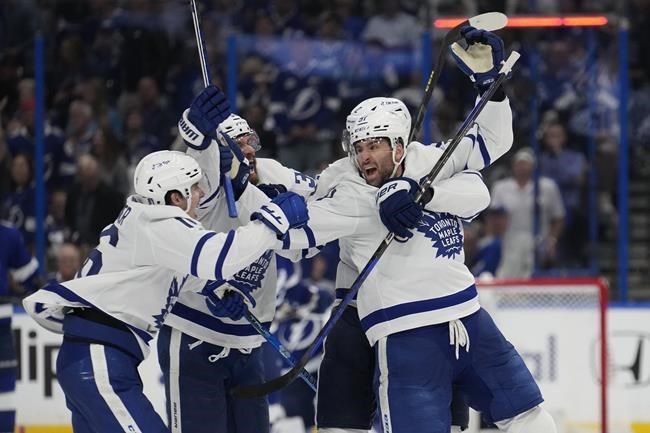TAMPA, Fla. — NHL teams scrap and claw throughout a gruelling 82-game schedule.
The first hurdle, of course, is to make the playoffs.
After that, it's all about climbing the standings as high as possible when the post-season dance and the chase for the Stanley Cup gets going every spring.
Earning a spot in the top-half of the bracket means starting a series at home.
It hasn't been much of an advantage in 2023.
There's a grind and sacrifice to secure that Game 1 — and the right to host a potential Game 7 — but does it really matter in hockey's modern era with cookie-cutter rinks and rosters that are mostly built the same?
Heading into Sunday's action, visiting teams were 29-18 through 47 games in these playoffs, good for a .604 winning percentage, after going 18-29 last spring — the first normal post-pandemic campaign after two one-and-done formats in 2020 and 2021.
The numbers from a year ago are more an anomaly than the norm in recent times. Road teams were 26-21 in both 2016 and 2017 before going 24-23 in 2018. The 2019 playoffs saw a mark of 21-26.
The 2012 post-season also had road teams go 29-18, but the next two playoffs produced records of 17-30 and 15-32.
"You always want to play at home," Edmonton Oilers forward Ryan Nugent-Hopkins said. "(But) sometimes on the road, you have a different mindset of playing simple.
"This year … teams are winning on the road."
Tampa Bay Lightning head coach Jon Cooper, whose club dropped three overtime games at home and won twice on the road in a first-round defeat at the hands of the Toronto Maple Leafs, said chopping the field from 32 to 16 combatants at the start of the playoffs has something to do with the success of visitors in hostile environments.
"They're used to winning on the road," he said. "Because they wouldn't be in the playoffs if they couldn't."
Cooper also had a theory about tension in the stands if things aren't going well for the home side.
"Crowd can be a bit of a disadvantage for you," he explained. "You can feel it work for you and it can work against you."
The current crop of NHL arenas — state-of-the-art, multi-purpose entertainment venues — are a far cry from bygone times when buildings were smaller, rink dimensions weren't uniform, fans sat a lot closer to the action, and teams were built to take advantage of their surroundings.
Winnipeg Jets head coach Rick Bowness, whose group was eliminated in five games by the Vegas Golden Knights after taking the best-of-seven series opener in Sin City, said there are a number of factors for teams' success on the highway.
"The physicality of the game isn't the same as what it used to be," he said. "Some of the rinks you used to go into, they were intimidating, not only from the crowd's perspective, but from the style of play of the home team."
Bowness said with an emphasis on speed and skill, most rosters are built using similar blueprints. Gone are the days where a team is allowed to drag an opponent into the muck or down an alley.
"It's not the physical side of the game that intimidates people anymore," Bowness said. "The crowd noise, the players get used to it. The game is much faster."
Toronto captain John Tavares, who scored the Leafs' series-clincher against Tampa on the road, said there's also little to choose from at the top of the standings.
"League's just really competitive," he said. "It comes down to a handful of plays."
Oilers head coach Jay Woodcroft said the home team getting the last change after stoppages is the only true advantage.
"We want to play a brand of hockey that translates wherever it is you play," he said. "Whether that's home, that's the road, it doesn't matter."
When it comes to matching lines, Edmonton star Leon Draisaitl said the skill across the NHL makes it less of a factor than in the past.
"(I) truly believe that every third, fourth line on every team is good enough to play against every first line," said Draisaitl, whose team clinched its series with the Los Angeles Kings on the road. "They all (have) good hockey sense. They're all hard to play against."
Leafs head coach Sheldon Keefe said regular-season home and away records are often skewed because of long trips, injuries or other circumstances.
"The playoffs, it's all equal," he said. "Everybody's on the exact same schedule for the most part.
"Things seem to equal themselves out in the playoffs and teams just play hockey."
Lightning forward Brandon Hagel said before Game 6 against Toronto the dominance of road teams in this post-season was a talking point among players.
"You're kind of like, 'Oh, home ice doesn't really matter,'" he said. "That's the mindset you've got to have."
Hagel also echoed his coach's view that home fans can be a factor one way or the other.
"You can feed off the energy when things are going great," he said. "Fans are so supportive and want to give you everything, but at times they're getting nervous, too."
Tavares said it comes down to margins being so close and teams responding in difficult moments.
"That's just the nature of the game and how competitive our league is," Tavares said.
"And what playoff hockey is all about."
— With files from Donna Spencer in Los Angeles, Gregory Strong in Las Vegas and Steven Sandor in Edmonton.
This report by The Canadian Press was first published April 30, 2023.
___
Follow @JClipperton_CP on Twitter.
Joshua Clipperton, The Canadian Press



